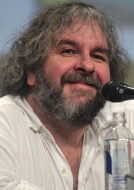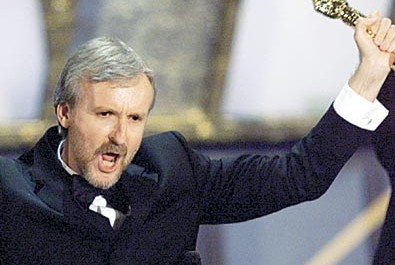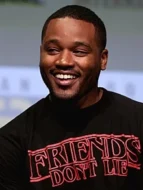Send Entries To: directorschairlamb@gmail.com
Deadline: 6th November 2021
Hello everyone, it’s time to announce the featured director for October. Usually in October I highlight a director known for horror films and so this month I’ve decided to highlight the work of Peter Jackson.
Jackson started his career as a director of incredibly gorey horror films, beginning with Bad Taste. Filmed at weekends with Jackson and his friends in the cast, mostly working for free and with props made in Jackson’s mums oven, the film took 4 years to make and was very nearly not finished, were it not for an injection of funds from the New Zealand Film Commission. After Bad Taste came Meet the Feebles. Originally intended to be part of a TV series, interest from Japanese investors led to it being expanded into a feature film, with the New Zealand Film Commission once again providing funds for the film (although they ended up taking their name off the film upon completion). Whilst it was a commercial flop on release, it, along with Bad Taste, ended up gaining a cult following.
After these came Jackson’s most famous film from his time as a splatter director, Braindead (released as Dead Alive in the US). This film is now known as one of the goriest films ever made, with a reported 300 litres of fake blood used in the climax, although the exaggerated tone of the film led to it being viewed as comedy, to the point where the BBFC came close to rating it a 15 rather than an 18. Whilst the film was not a commercial success on release, it did receive positive reviews, winning several New Zealand Film and Television Awards and has been noted as an influence on films like Shaun of the Dead.
Jackson was then persuaded by his partner and writing collaborator, Fran Walsh, to move into drama, making a film based on the Parker-Hulme murder case, Heavenly Creatures. After extensive research, including reading the diaries of Pauline Parker, the two decided the film should be focused on Parker and Hulme’s friendship, with Melanie Lynskey and Kate Winslet being cast as Parker and Hulme. Jackson also made the decision to film in the locations where the real events took place, initially including where the real murder occurred (although it was eventually decided to film the recreation of the murder somewhere different). The film was heavily acclaimed upon release, winning numerous New Zealand Film and Television Awards and being nominated for the Oscar for Best Adapted Screenplay. It was also around this time that Peter Jackson helped found Weta Digital to produce the effects for the film, which is now one of the most important and widely used providers of CGI in modern film and TV.
Following a TV mockumentary, Forgotten Silver, Jackson moved to Hollywood, and back to horror, with his next film. Originally intended to be a film spin-off of Tales From The Crypt, directed by Robert Zemeckis, it was later agreed that Jackson would direct the film, with Zemeckis producing, and for it to be a stand-alone film, giving us The Frighteners. Working with his largest budget at the time, albeit still in New Zealand with the production design making the filming locations look like the Midwestern US, the initial cut of the film impressed the Universal executives enough to give it a prime summer release spot and give Jackson the funding for a passion project of his, a remake of King Kong. However, the film was not a success upon release. A combination of mixed reviews, an R rating, the success of Independence Day and the 1996 Atlanta Olympics led to the film being a box office disappointment, although it is now a cult favourite.
It was during post-production on The Frighteners though that Jackson started the motions for his greatest success. After brainstorming ideas for an original fantasy film with Fran Walsh, they felt that all of their ideas were derivative of JRR Tolkein and so decided to see who had the rights to The Lord of the Rings. After getting Miramax to buy the rights to the series, they originally had a pitch for a trilogy with The Hobbit as the first film and a two part adaptation of Lord of the Rings. There were issues over obtaining the rights, which led to Jackson signing on to direct the remake of King Kong for Universal, but when Universal were worried about competition from the upcoming versions of Godzilla, Mighty Joe Young and Planet of the Apes, the King Kong remake was cancelled. This led to Jackson going back to Lord of the Rings, however the budgets for the scripts written would exceed the budget Miramax wanted so they tried to get it made as one film. Jackson refused and got Miramax to put the film in turnaround, albeit with onerous restrictions that Miramax put in to try and prevent other studios from picking up the film. This didn’t work and New Line Cinema president Bob Shaye accepted the project, on the condition that it be adapted as a trilogy.
Making all three films at the same time, it being one production rather than three separate ones, the films were a massive undertaking, taking advantage of the New Zealand locations and pioneering visual effects from Weta, the films were a monumental achievement and are still considered the gold standard of fantasy film making. All three films were critical and commercial successes on release, culminating in Return of the King winning all 11 Oscars it was nominated for and becoming the second film to gross over $1 billion, becoming the second highest grossing film worldwide at the time.
The success of Lord of the Rings allowed Jackson to finally film his remake of King Kong, with the script for the remake being written from scratch and Jackson brought over most of the crew from Lord of the Rings. Working from the script from the original King Kong, including expanding scenes that ended up being deleted from it, most notably the Spider Pit, upon release it was a critical and commercial success, winning several technical awards at the Oscars, although there was criticism for the depiction of the Skull Island inhabitants and the 3 hour runtime.
Jackson moved to a smaller scale film after King Kong, directing an adaptation of The Lovely Bones after original discussions with Lynne Ramsay fell apart. Whilst there were some behind the scenes issues, mainly with the character choices made by Ryan Gosling going against Jackson’s vision for the film, leading to him being replaced with Mark Wahlberg, filming was fairly smooth. The film received a fairly mixed response on release, mainly focused on the tone of the film not working, although the performances from Saoirse Ronan and Stanley Tucci were highly praised, with Tucci being nominated for Best Supporting Actor at the Oscars.
Following The Lovely Bones, Jackson returned to Middle Earth with The Hobbit trilogy. Despite not originally intending to direct, with Guillermo Del Toro being appointed to the position, Jackson ultimately took the directors chair after Del Toro left due to production delays and creative differences. However, production on The Hobbit ended up being difficult for Jackson. He wasn’t given the same level of pre-production time that Del Toro had due to the commitment for a December 2012 release and there were difficulties over filming in New Zealand, which resulted in long term damage to the New Zealand film industry due to New Zealand government allowing legislation to go through to prevent unions from being formed, to placate Warner Bros. Additionally, Jackson decided to experiment with shooting the film in 48 frames per second, which ended up being a failed experiment. The combination of all the difficulties led to Jackson getting burnout and contributed to the decision for The Hobbit to be split into three films rather than two. The Hobbit trilogy was a commercial success, but critically the reception to the films were mixed and time has not been kind to them, with their reputation suffering over the past few years due to the issues caused by splitting the relatively light book into three films.
The Hobbit trilogy marks the most recent narrative works Jackson has directed. Whilst Jackson intended to direct a sequel to The Adventures of Tintin: The Secret of the Unicorn, with Steven Spielberg producing (reversing the roles they had on the first film), there hasn’t been any update on that film since 2016 and, although he was involved in writing and producing Mortal Engine, Jackson gave directing duties to frequent collaborator Christian Rivers.
Jackson has now moved into documentary filmmaking, utilising the effects work of Weta to restore archive film footage. The first of these came when Jackson was commissioned by 14-18 Now, the Imperial War Museum and the BBC to make a documentary to mark the 100 year anniversary of the end of the First World War, They Shall Not Grow Old. Jackson and his team decided the best documentary to make would be one focused on the words and footage of the soldiers, using archival audio recordings as the narration to the film. The biggest element though came with the footage used. Jackson decided to heavily restore it, converting it into colour and in 24 frames per second and 3D, with lip readers being employed to create sound for it, and, although only a small section of footage was used, Jackson restored all 100 hours provided to him by the Imperial War Museum. The film was a critical success on release, being praised for the restoration work and atmosphere of war created.
Jackson has now turned his restoration efforts to footage of The Beatles, working with Disney to restore the footage filmed during the Let It Be recording sessions, including the rooftop concert, with Jackson having the full cooperation of Paul McCartney, Ringo Starr, Yoko Ono and Olivia Harrison. Originally intended to be a theatrical film, the extent of the restoration led to Disney deciding to release it as a 3 part documentary series on Disney+, with it being scheduled for release next month.
As a reminder, the films of Jackson’s you can cover are as follows:
- Bad Taste
- Meet the Feebles
- Braindead
- Heavenly Creatures
- Forgotten Silver
- The Frighteners
- The Lord of the Rings: The Fellowship of the Ring
- The Lord of the Rings: The Two Tower
- The Lord of the Rings: The Return of the King
- King Kong
- The Lovely Bones
- The Hobbit: An Unexpected Journey
- The Hobbit: The Desolation of Smaug
- The Hobbit: The Battle of the Five Armies
- They Shall Not Grow Old
I look forward to reading what you send me.




